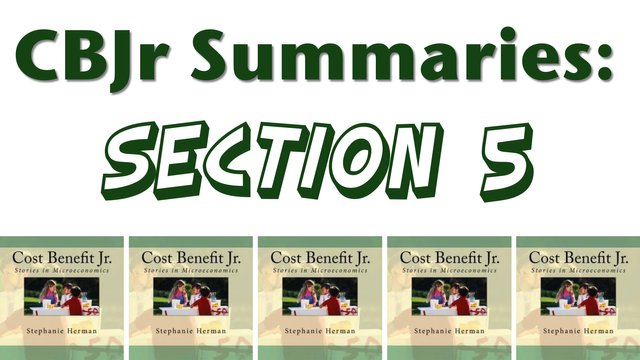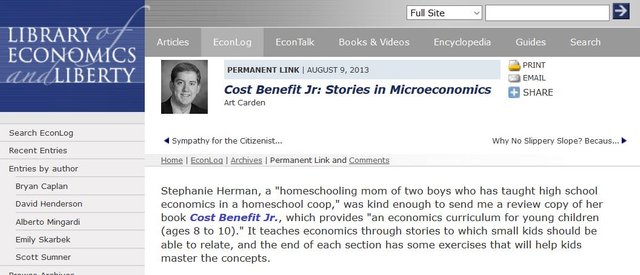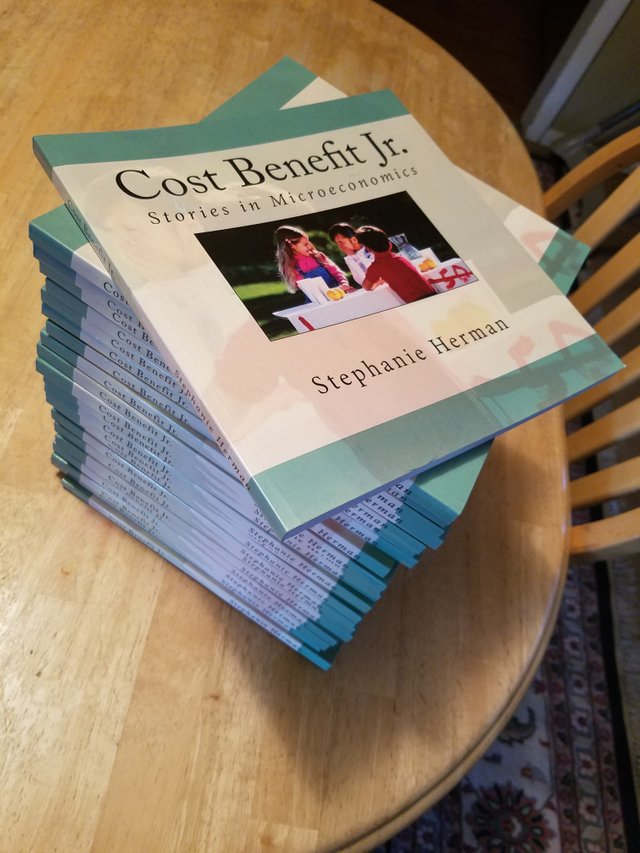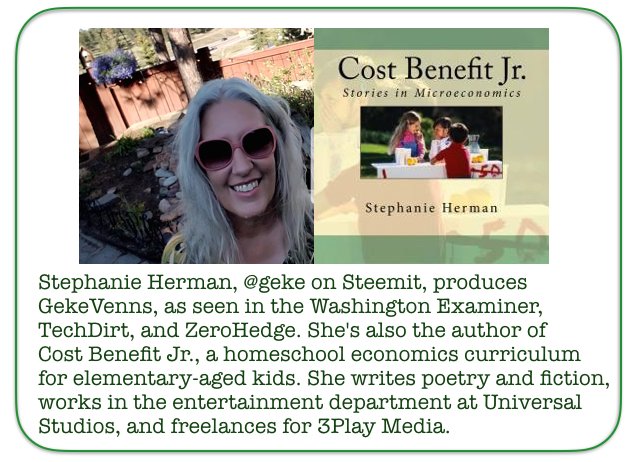CBJr Economics Summaries: Face Off -- Section 5

Describing Cost Benefit Jr.™ on the Library for Economics and Liberty website, economics professor Art Carden highlighted the fact that our curriculum “teaches economics through stories to which small kids should be able to relate, and the end of each section has some exercises that will help kids master the concepts. It's a really great little book; one of its major strengths is periodic side boxes featuring a cigar-chomping jerk named Mr. Greedy L. McMeanie that show how even though Greedy L. McMeanie is a jerk who doesn't care at all for his customers and who only seeks profit, he is forced by competition to provide them with what they want at prices they are willing to pay.”

We thought it was important that Cost Benefit Jr.™ engage young kids in a literature-based format. Students as young as eight can learn complex concepts like supply & demand, opportunity cost, and diminishing marginal utility when they’re presented in simple stories. Each weekly story and quiz will take the average 4th grade student 20 to 30 minutes to read and complete. The curriculum is meant to cover a normal school year and is ideal for homeschoolers or as a quick & easy supplement to classroom learning.
Section 5: Face Off: A Little Friendly Competition
In the fifth section of Cost Benefit Jr.™, students are introduced to some entrepreneurial kids. In one story, two boys compete for business opportunities. And in another, parents compete for the ability to consume the service of their neighborhood's best babysitter. It's important that kids realize that competition doesn't just affect producers and suppliers. As consumers, we compete with other people every day in our attempts to procure the things we need.

But maybe the best way to illustrate competition between consumers is with an auction. Lesson 22 in the book focuses on a red canoe and a man making bids to buy it. When the bidding is over and one bidder has won the canoe, the story points out an important takeaway: “Just because they had been competing against one another for the boat didn't mean they had bad feelings. Competition is a naturall way for people to sort out life's highest bidders – those who value the world's various limited resources the most.” In other words, competition is how we allocate resources. If kids learn this early, imagine all the mistakes our world could avoid in trying to allocate resources in less decentralized way!

Remember that once these summaries are complete, we'll be holding a contest for five free copies of Cost Benefit Jr.™!
Entries will be in the form of a comment, so be thinking about something you can submit (in the contest announcement post) explaining what you'd like to teach your kids, your grandkids, or yourself about economics and decision making.
Or, and this is a new idea -- tell us about your favorite section of the book, based on the summaries, and why you'd like to teach your student the lessons contained in whatever section you end up choosing. Again, these comments will be submitted at the very end, in the contest announcement post.
Thanks for reading along!


My mom likes the sound of these books. Did you help author them?
Nm I see u did.... Name right there on the cover
Lol
Great stuff! I was looking for something "Ron Paul Homeschool" ish, but my oldest is still a little young (4yrs).
Is the Cost Benefit Jr. publication on Amazon the most up to date or do you have a direct website link?
My createspace link (on my Steemit blog wall) now points directly to Amazon, but you might want to hang out and wait for the contest. I'm giving away five copies!
I know nothing about economics so take this with a grain of salt- but wouldn't it be more useful to teach kids that even with limited resources, if we make sure everyone has enough, then we wouldn't have to compete, at least not as much?
I haven't thought that entirely through but I think that's where I'm at- but I agree that decentralization might solve a lot of these issues.
My first question would be: how do we make sure everyone has enough?
If there's one thing I've learned about human beings it's that no one ever has enough for everyone. Ever. The belief that it's possible is effectively toxic to making long-term decisions about allocating resources and it asserts are very authoritarian notion that somehow other people have a greater claim to my time than I do.
So given that conflict over resources is inevitable, shouldn't we teach children that there are good, safe, controlled methods that they can engage in conflict and resolve things? Further, that sometimes you just don't get what you want.
I would much rather have a generation of children who were taught that conflict is inevitable and that they can strive together one another like brothers than that if we only take the right things from the right people, everybody will have everything they want.
One of these things is clearly observable, and the other one is clearly observable as false.
Absolutely, conflict is inevitable, and ensuring that kids can handle conflict in an appropriate way is important. And it is extremely difficult to determine what resources are enough- as this is different for everyone. This seems counterintuitive with the sharing post, which claims that sharing first means that there is an initial ownership. There must be a happy medium between ensuring everyone has their basic needs met and personal freedom, but I don't know if that exists yet. It's certainly not a capitalist society or a communist society.
Let's be clear – it's not "extremely difficult to determine what resources are enough," it is literally impossible. Not just socially impossible, because different people have different needs and desires, but mathematically impossible. It would require perfect foreknowledge not just of production requirements but logistical requirements (and all of that complicated by the fact that humans will always be humans).
Sharing first does mean that there has to be an initial ownership. You can't share something you don't own. Or you can, but we have a word for that: "theft." In order to share something you must control it in order to decide who gets it.
The only medium there is between "ensuring" everyone has their basic needs and personal freedom is an unhappy one. This is not a function that can be optimized for maximum happiness with the results being that all members are thrilled with what they get. At best it's a function that can be optimized for minimum unhappiness, and because perfect foreknowledge and understanding of what another person wants and desires is impossible, only the people involved can maximize their level of satisfaction.
That's why capitalism works. That's why capitalism, over the last 60 years, has seriously, vastly, reduced the number of people living in poverty all over the planet. The spread of capitalist free market economics ensures that people are able to look after their own needs as best they can, that they're responsible for looking after their own needs. That's not to say everyone gets everything they want and need – because that's impossible. What it does say is that it's the best method of allocation that we have available that reflects local knowledge and local desire.
Most of the failings of free market systems occur because someone outside the context of the interaction points a finger and says, "that's not really what you want," or "that's not something I want you to have," or "you need to do that a different way," all of which impacts market exchange in a negative way. It's the imposition of external will out of accordance with those who would engage in a free exchange that seems to break things the worst.
So: to share you must have stuff. It's impossible to determine "what is enough." And it's probably a good idea to discard the myth of "the happy medium that destroys your freedom."
@geke - I have very little experience with children of younger ages (except from teaching them origami), but I wonder if you have any plans of doing something for the high school student as well because I don't think the way they teach economics (or indeed most subjects) makes much sense either. I am probably a bit on the extreme side since I advocate for removing the terms art and science altogether (or defining them better!). It's great to see people advocating for a better education system / curriculum because the government isn't going to :D
Please me vote comment